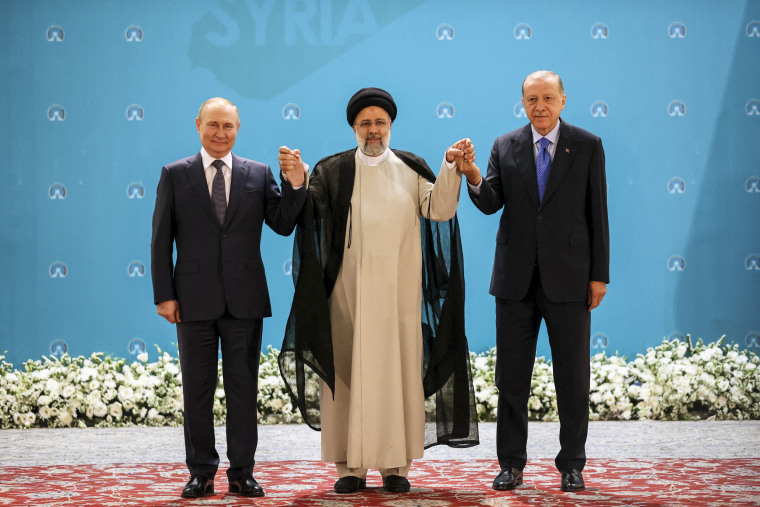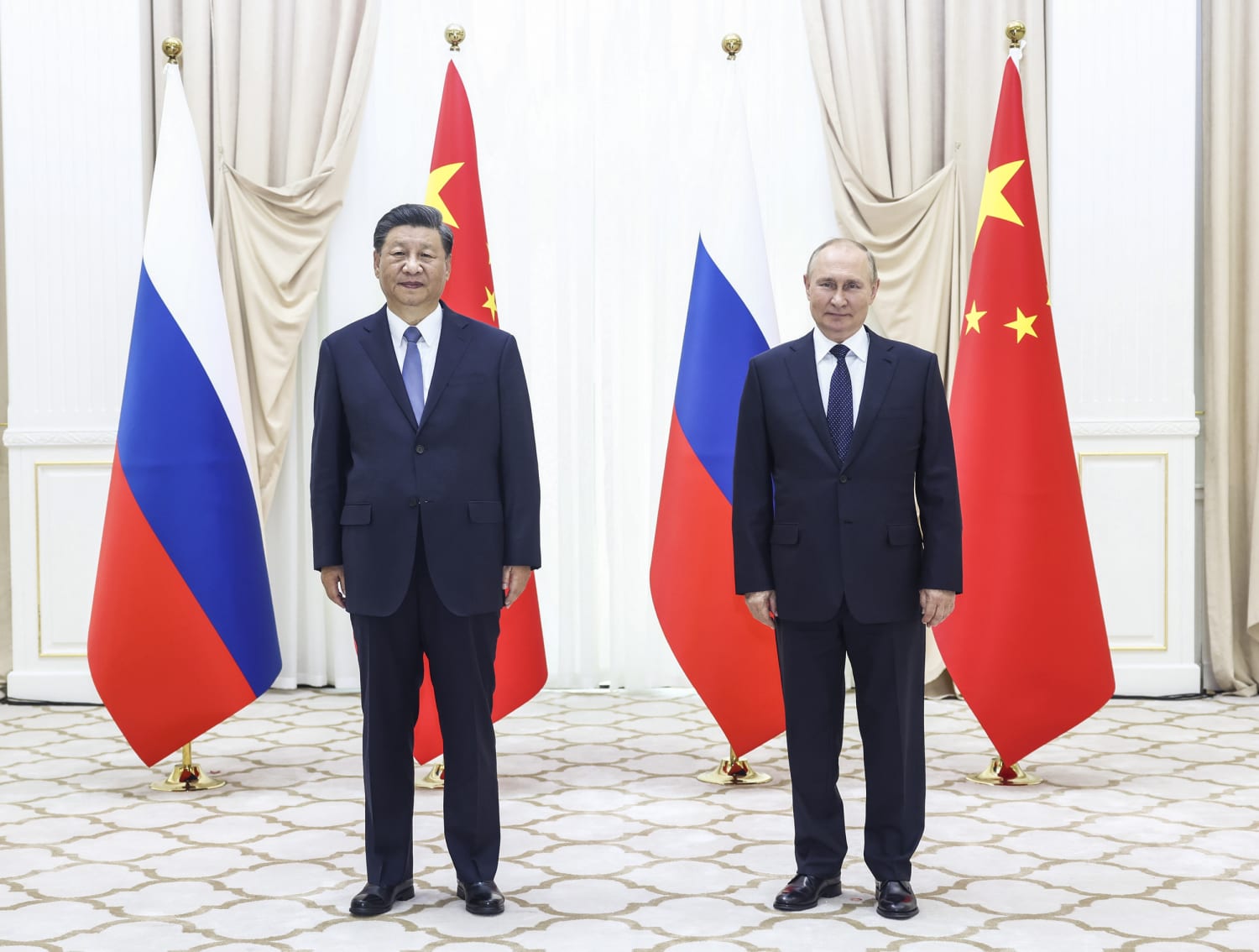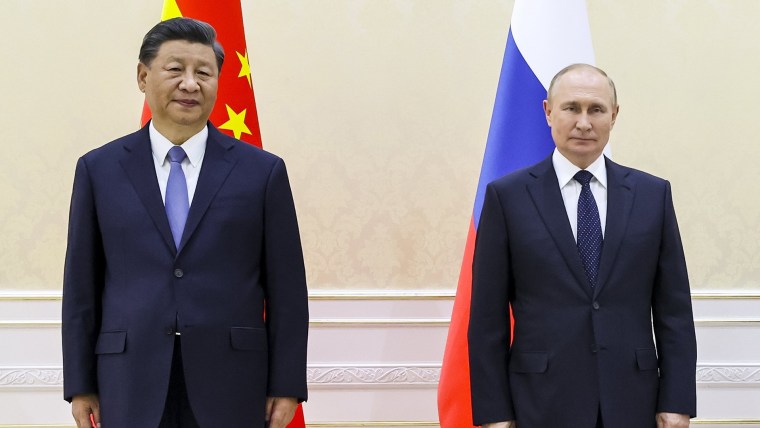Russian President Vladimir Putin might be losing on the battlefield, at least for the moment, but it’s a mistake to count out the master of the Kremlin.
Instead, quietly, Putin is succeeding in assembling a coalition of the autocratic. Who is in Putin’s “axis of evil,” as President George W. Bush famously called a similar collection? An unlikely but utterly pernicious group straddling continents and political systems. All are worried to varying degrees about the trajectory the war in Ukraine is setting for their economy and their role in the geopolitical landscape, but they are still fully prepared to profit from it in the meantime.
The U.S. can’t assume a defeat on the battlefields of Ukraine is enough to end the threat of Putinism. It’s not even enough to diminish the Russian leader’s influence in Europe.
From more traditionally autocratic leaders — China’s Xi Jinping, North Korea’s Kim Jong Un and the ayatollahs of Iran — to leaders of illiberal democracies in India, Turkey and Hungary, a host of countries are prepared to offer their good will, manufacturing muscle or markets to the Putin war machine.
This means the U.S. can’t assume a defeat on the battlefields of Ukraine is enough to end the threat of Putinism. It’s not even enough to diminish the Russian leader’s influence in Europe, with Sweden and Italy on the precipice of forming new governments that could tilt toward him as well. The U.S. cannot — must not — get complacent and think military aid to Ukraine is enough to stop his threat. The West must have a much broader strategy.
The bulk of the members of this group share one common attribute. They either want, or desperately need, the cheap Russian oil and gas that Putin is now prepared to offer or are eager to forge ties with a fellow international pariah. Several of them converged this week in Samarkand, Uzbekistan, as guests of Putin and members of the Shanghai Cooperation Organization that Russia and China created in 2001 along with several former Soviet Central Asian republics, since joined by India and Pakistan.
Xi was the most carefully watched of these leaders on Thursday as he made his first trip abroad since the outbreak of Covid. The Chinese leader described Putin as “my old friend,” while Putin observed, “We highly value the balanced position of our Chinese friends when it comes to the Ukraine crisis.” While Xi failed to mention Ukraine in his public remarks, taken in some quarters as an intentional snub, he did say China strongly supported Russia’s “core interests.”
However he might express himself publicly, Xi has proved more than willing to satisfy Putin’s principal need: a vast market for discounted Russian oil, natural gas and coal to offset the sanctions imposed by the West for his invasion of Ukraine. Deliveries of Russian gas have tripled this year and crude imports have soared by 55%, with China also stepping up its purchases of cheap Russian coal as it tries to bolster an economy hurt by Covid-related shutdowns.
North Korea wasn’t at the Samarkand session, but Kim Jong Un’s import needs are easily as acute as China’s. Kim has reportedly concluded a deal to supply millions of rocket and artillery shells paid for with Russian wheat and oil.
On the other hand, the leader of the world’s largest democracy did show up in Samarkand. India’s Narendra Modi has already carved out a “special partnership” with Putin, boosting cooperation on energy and coking coal, a critical component for India’s steel industry. And he wants cheap gas for his impoverished citizens, so Russian crude shipments to India have surged six-fold since February.
Iran is a newcomer to the Shanghai organization, but it’s no surprise it would be looking to join whatever international groups will have it as a member.
Iran is not only selling Putin battlefield drones but providing a rare show of unbridled support for his operation. “If you had not taken the helm [in Ukraine], the other side would have done so and initiated a war,” Iran’s supreme leader Ayatollah Ali Khamenei told Putin during a visit this summer.
A telling photo showed Khamenei and Putin grasping hands in friendship — along with Turkish President Recep Tayyip Erdogan, who also came to Samarkand for his first visit to an SCO summit. Like fellow members of Putin’s axis, Turkey has all but ignored Western sanctions and doubled its purchase of Russian oil, while Turkish companies have agreed to cooperate in a host of industries despite the sanctions.

In addition to welcoming cheap energy supplies, Erdogan is eager to have more leverage internationally by playing off different sides. He’s one of the last NATO holdouts on ratifying the admission of Sweden and Finland as NATO members, brokering deals to get their help in his fight against Kurdish rebels in return for his assent. And he’s extracting the same from Putin. Last month, Erdogan met with him for four hours and came away with a pledge to “act in coordination and solidarity in the fight against all terrorist organizations in Syria” — a euphemism for Turkey’s efforts to stamp out the Kurdish YPG militia.
While Erdogan has traditionally been a fence-sitter, other countries even further to his west that are cozying up to Putin should be the nail in the coffin of any American assumption that the disastrous Ukraine war effort has dealt him a fatal blow.
Hungary’s Prime Minister Viktor Orban has for some time been Putin’s leading stalking horse within the European Union, refusing to send any military aid to Ukraine, signing a gas deal with Russia and refusing to cut use of natural gas this winter by 15%, like every other E.U. country.
But until now, the other European politicians pushing ties with Putin weren’t leading their respective countries. On Sept. 11, though, Swedish voters gave a majority in parliament to a right-wing coalition that includes Jimmie Åkesson and his Sweden Democrats, which opponents have attacked for its sympathies for Europe’s fascist past and Putin’s militaristic present.
Italy may be poised for an even more determined swing toward Putin. The nation’s leading polls all point to a win on Sept. 25 for Giorgia Meloni and her Brothers of Italy party in coalition with Matteo Salvini, an unabashed Putin sympathizer and sanctions opponent. The E.U. still requires unanimity to renew sweeping sanctions against Russia every six months. Much of the swing toward the right in Sweden and Italy is driven by domestic considerations — especially inflation, which sanctions exacerbate.
So how is America to battle this new axis Putin has assembled? In the short term, the U.S. must make clear to every leader that their actions could carry a very steep price — far higher than paying full price for oil. The West is a major market for products from China and India that can be deeply impacted by tariffs, even embargos.
The U.S. must make clear to every leader that their actions could carry a very steep price — far higher than paying full price for oil.
Longer term, leaders like Modi, Erdogan and Orban need to be reminded that they are all products of at least quasi-democratic systems. Will they want their political futures hitched to Putin as the Ukraine war drags further on his image and capabilities?
Even Xi faces headwinds within his Communist Party. As Cai Xia, a professor once affiliated with that party, recently observed: “[B]ehind the scenes, his power is being questioned as never before” as his ties with Putin further alienate China from the international community.
President Joe Biden has said he’s “sure” he will see Xi at the G-20 summit in November. There would be no better time for the president to describe in clear terms the dangerous game Xi and his fellow axis members are playing.
Source: | This article originally belongs to Nbcnews.com










